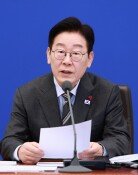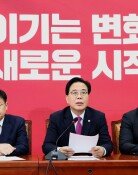Let Universities Select Their Students and Allow Partial Adoption of Money-for-Seats Admission
Let Universities Select Their Students and Allow Partial Adoption of Money-for-Seats Admission
Posted July. 01, 2005 05:54,
The Korean Council for University Education (KCUE) held the 2005 Summer Seminar of University Presidents under the theme of Strategy and Challenges for Improving University Competitiveness on June 30 at the Hotel Inter-Bulgo in Daegu. In the seminar, the council urged the government to increase the autonomy of universities and assist financing for university restructuring.
Some 163 presidents of universities, including Korea University, Yonsei University and Kyung Hee University participated in the seminar. The presidents had discussions on current issues in seven subcommittees, such as one for improving university admissions, university restructuring, and balanced national growth, and decided to submit their proposals to the Ministry of Education and Human Resources Development.
KCUE Chairman Park Young-sik, president of Kwangwoon University, said, The reason for weakened university education lies in the financial structure depending on tuition fees and the large number of students caused by the popularization of a university education, adding, Universities should make a painstaking effort to conduct restructuring, and the government should actively assist the effort.
Lee Hyun-cheong, the secretary general of the KCUE, pointed out in a report on the trends of higher education that universities should make their own brand by breaking from redundant investments and damaging competition and by maximizing their competitiveness, adding, Without a parallel approach of a merger of universities and qualitative restructuring, we will end up creating bland universities just like a large department store.
The main points of the subcommittee discussions were as follows:
Grant Universities the Authority to Select Students-
The government should leave the authority of selecting students to the hands of universities starting in 2007, when the Education Ministry will hand over the management of the college admission system to the KCUE. The government should at least allow various types of essay testing as it maintains its Three-no policy, including prohibition of universities running of their own entrance tests. It should improve the money-for-admission system and adopt it on a limited basis for the development of universities. Also, it should expand a special no-test admission of would-be lifelong education students.
Refrain from Restructuring-
The Ministry of Education and Human Resources Development just focuses on cost-saving and does not agonize over universities role in local development. The government should be cautious in merging universities. Its standards of marginal universities should be rigorous, including the number of students, graduation rates, and debt ratio. While driving marginal universities out of the market, it should drastically support those that strive to improve their quality of education through harsh restructuring. It should also devise measures for a soft-landing, such as assistance in retraining laid-off professors. It should avoid regimented restriction-oriented restructuring.
Reduced Students Put Burden on Universities-
The precondition for participating in the assistant project for university restructuring does not adequately reflect the size and features of universities. The precondition requires more than 54.5 percent in the ratio of full-time faculty members and a 10 percent reduction of the number of students over the next two years until 2007. The amount of assistance budget for restructuring, 80 billion won, is too small. Universities cannot be assisted as much as they reduced their numbers of students. For example, Yonsei University, if it reduces the number of its students by 10 percent, will see 20.7 billion won in financial losses over four years and an annual loss of 11.3 billion won from 2010. Against this backdrop, the government should raise its funding for higher education up to one percent of GDP by legislating grant acts on higher education finance. Also, it is essential to improve the taxation of private universities, such as classification of donations as losing money, and attracting more private investment.
Equal Distribution of Law Schools-
The government should apply the principle of balanced national growth, when it makes decisions on law schools. Two or three nearby universities could form a law school consortium, which enable the law school to have impacts on the local community and prevent the outflow of provincial talents. Another way is to allot a quota for provincial university graduates in state examinations and state-funded corporations employment. In this regard, adopting a university admissions system like balanced selection among applicants from various regions is desirable.
In-Chul Lee inchul@donga.com







